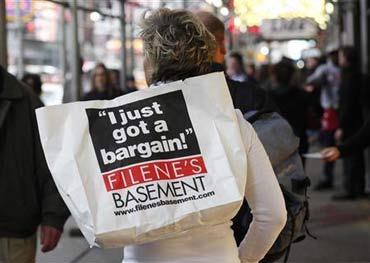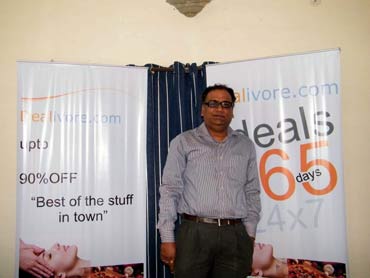 | « Back to article | Print this article |
Dealivores love online deals!
Satish Madhira, managing director of the Hyderabad-headquartered Dealivore.com, says that although online deals and coupon sales are nothing new outside India, his start-up is a new concept in India.
Dealivore.com is a start-up operating in the daily deal space. The company has its presence in cities like Bengaluru, Chennai, New Delhi and Pune and soon will be in 10 more locations, including Mumbai, Kolkata and Ahmedabad.
Dealivore.com offers up to 90 per cent savings in local retail outlets for consumers in services and products sector such as fine dining restaurants, spas, salons, healthcare, jewellery, clothing, etc.
According to him, local retail outlets is a Rs 6,000 crore (Rs 60 billion) advertising market and 10 per cent will be done through coupons soon.
"It's a new market and new product and a huge unexplored space."
In this interview, he talks about what online deals are and what customers must be careful about.
Click NEXT to read on . . .
Dealivores love online deals!
Your website says, 'Herbivores love vegetarians, Carnivores love non-vegetarians and Dealivores love deals'. How did you come up with a name like Dealivore?
We always come up with slightly whacky names. Our first start-up used to be called Yasu which was "Yet another Start-up"!
When we thought of what really represents what we are trying to do, we found that we were trying to hunt a deal. From hunting, we moved to carnivores and herbivores and then thought it made sense to come up with a name like Dealivore!
It represents our company rather than the customer. The site is about us hunting a deal for the customer.
Do people really love deals?
In the Indian context, either you have a value conscious customer or somebody who is looking for very high-end brands; a sort of an aspirational customer.
In the United States, there is this 90-year-old $40-50 billion coupon industry, but in India, we are not yet accustomed to the coupon industry; nobody has pampered us with coupons.
But today, more dealers want to acquire and keep a customer. With this new phenomenon, many Indians are now looking for good deals.
Indian retail industry is as big as Rs 4 lakh crore (Rs 4 trillion) and 15 per cent-plus will be in the local retail services. So, we are talking about Rs 60-70,000 crore (Rs 700 billion) of business.
Capacity utilisation in any outlet is never 100 per cent at any point of time in the retail sector. It is a Rs 6,000 crore advertising market and 10 per cent will eventually turn out to be through coupons.
It's a new market and a new product and a huge unexplored space. It is a universal phenomenon to look for good deals. Globally, it is more widespread because they understand coupons but in India, we haven't been introduced to deals yet.
Click NEXT to read on . . .
Dealivores love online deals!
What was the spark behind starting Dealivore?
We found that small retailers are more interested in getting customers. When we looked at the global scenario, we found that discount coupons worked globally.
Then we thought, why don't we try the same thing in India, but customised to the Indian context? That is why we target the social community like Facebook. Indians do not trust anyone but their friends or relatives.
How do you operate on Facebook?
We have about 250,000 fans on Facebook. We do a lot of advertising on Facebook. We start deals on Facebook as well as our website.
We find that 1 per cent of the consumers share the deal. We get 100,000 queries because of that.
With how much capital did you start the company?
We launched Dealivore in March 2010. We had close to Rs 5 crore (Rs 50 million) tied up in funding, Rs 2 crore (Rs 20 million) have already come in and the rest of the Rs 3 crore (Rs 30 million) will be in soon.
It was primarily from the founders and angel investors. Primarily, the investment went into marketing.
Click NEXT to read on . . .
Dealivores love online deals!
Was it tough convincing retailers about the idea of offering coupons to consumers?
Initially, it was tough to convince retailers. We targetted retailers like restaurants, saloons, fitness centres, etc. A small restaurant though a good brand finds it hard to reach its target customers unless they spend money on advertising.
When a restaurant gives a say 50 per cent deal, customers find it interesting.
How exactly do you operate and how does it help your customers and also a consumer?
Typically, the discount is about more than 50 per cent. If you ask how a fitness centre manages to give more than 50 per cent discount, it is like this: He has the equipment and the toughest is to get the customer.
So he spends 40 per cent of the cost in advertising. What we tell him is, give us one month's subscription at 50-90 per cent. The idea is that if the consumer comes and tries the gym and if he really likes the gym, he will continue to use it at the usual price.
If you take the case of a restaurant and he has offered vouchers valid for three months at a price less than 40 per cent his cost, and if he gets 200 customers, and if 20 per cent of these turn into his regular customers, it is win-win for him.
The promotion is to acquire a customer. A small retailer with a turnover of Rs 30-40 lakh (Rs 3-4 million) can't spend Rs 4-5 lakh (Rs 400,000-500,000) and put huge ads and compete with an MNC. That is the merchant's benefit.
Click NEXT to read on . . .
Dealivores love online deals!
How will the consumer benefit from the deal?
He is getting to test a new merchant at a sweet price. Today, you see that a family with a Rs 6 lakh (Rs 600,000) annual income going to a restaurant at least once in a month or once in 6 weeks.
So, the frequency of purchase is really high. That is why we look for frequency and relevance.
We found that in India, those who buy the deals are the middle and upper middle customers and not the low end customers. The age group is 20-40 with a household income of over Rs 6 lakh.
How can a retailer offer 50-90 per cent discount on a deal? Is it viable?
It's not viable all the time. Because there is a time period here for the deal which is 24-48 hours, but you can get the deal and make use of it in the next 3 months.
For the merchant, he is getting hundreds of customers to try his place. It's the cost of acquiring a new customer. Like advertising. Remember, he is not doing it below the cost. His benefit is getting new customers. Most of them repeat.
From a consumer's point of view, what should he look for in such deals and what should he be careful about?
Make sure that the deal has all the details and you understand the details. Sometimes, if it is a restaurant deal, it may say that the deal is only for weekdays. Make sure that you see that.
Every deal has some specifications and see that you read all the clauses. Fine print is not hidden but it will be right up there. We try to put the details in bold so that the consumers don't miss them.
The merchant and deal details are put up right on top. We give a write-up on what the merchant is doing as you may be trying him out for the first time.
Beyond the details, you need not be bothered about anything else. The rest of the things are standard stuff.
Click NEXT to read on . . .
Dealivores love online deals!
From when you started in March 2010 onwards, how many deals have you done?
For vouchers, we do an average of 1,800-plus customers driving into a merchant establishment per day, per city. In cities like Hyderabad, Pune Chennai, Delhi and Bengaluru, where we are physically present, the redeem rate is 70-80 per cent.
We have 250 merchants offering us deals and we have about 300,000 buyers. Our target is a million customers by next year. In 3-5 years, we want to be a Rs 60-100 crore (Rs 600 million to Rs 1 billion) company. We are growing 20 per cent monthly.
Are you expanding your presence in more cities? Is it important to have a presence in a place though your deals are done online?
We have to be there in all the metros and also in places like Ahmedabad. We look for a city which has at least a million people in the Rs 6-lakh household income bracket.
It is absolutely essential to have our physical presence in the places we operate.
It is important to deal directly with the merchants because what we offer are exclusively negotiated deals. We also do offline delivery and 25 per cent of our customers are offline customers. That segment is picking up strongly. We have a single number across all cities.
Any interesting deals that you can think of?
An interesting deal we had was for Spanish classes. There was a 70 per cent discount for a 3-month Spanish course. It was sold out.
We did an aerial tour of Hyderabad in a 4-seater flight and it was a huge success. It was a high priced deal but it was sold out.
Primarily these are local deals. And we have found that touch and feel and local deals work better than national deals.
<P>Click <STRONG>NEXT </STRONG>to read on . . . </P>
<P><iframe hspace=0 vspace=0 scrolling=no src="http://badges.pages.rediff.com/promote/best-of-business/68709?orientation=16" frameborder=0 width=462 height=60 allowtransparency='true'></iframe><a href='http://pages.rediff.com/best-of-business/68709'><img src=https://imworld.rediff.com/pagesrediff/pix/blank.gif width=0 height=0 target=_blank border=0 /></a>





